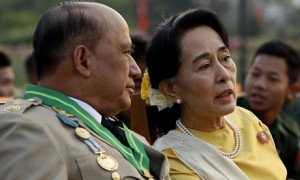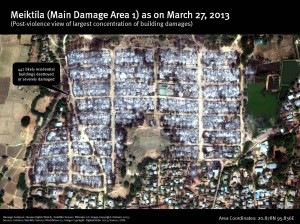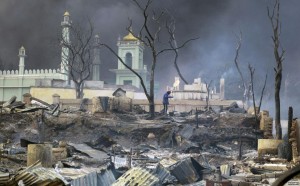Posts Tagged ‘Violence’ (71 found)
Daw Aung San Suu Kyi’s Political Reconciliation with Burma’s Armed Forces
 On 27 March, Burma’s Armed Forces Day was commemorated with its usual military fanfare. But this year, Daw Aung San Suu Kyi sat in the front row of the parade, raising concerns about her closeness to the army.
On 27 March, Burma’s Armed Forces Day was commemorated with its usual military fanfare. But this year, Daw Aung San Suu Kyi sat in the front row of the parade, raising concerns about her closeness to the army.
Daw Aung San Suu Kyi was similarly criticized for her comment on BBC’s Desert Island Disks radio show about her “fondness” for her father’s army. While Daw Suu appears to be cozying up the Burma Army as an attempt of political reconciliation in her push towards the 2015 elections, the public widely continues to see the country’s security forces as the perpetrators of human rights violations especially in ethnic nationality areas and of brutal crackdowns on civilians in 1988, 2007 and most recently in November 2012 against protesters and monks at the Letpadaung copper mine.
The Burma Army continued this week to launch offensives against the Kachin Independence Army (KIA) in northeastern Shan State, two weeks after the latest peace talks in Ruili, China. There have also been reports of shelling and looting of villages in Kachin State despite President Thein Sein insisting on his visit to Austria at the beginning of the month, “There’s no more hostilities, no more fighting all over the country, we have been able to end this kind of armed conflict.” General Gun Maw, deputy chief of the KIA said after the 11 March talks, “They wanted us to sign a ceasefire agreement first, but there are many issues to discuss about the peace process before we can reach a ceasefire.”
Furthermore, the military has been implicated in the violence in Meikhtila, which has left 43 dead and 12,000 displaced by UN estimates […]
Burma: Satellite Images Detail Destruction in Meiktila
Investigations, Accountability Needed to Deter Future Attacks
The Burmese government should thoroughly investigate and hold accountable those who incited and committed deadly violence in Meiktila in central Burma from March 20 to 22, 2013. Decisive government action to combat impunity, end discrimination, and promote tolerance among religious groups is needed to end the tide of attacks against Muslim communities […]
• • •Satellite-Based Damage Assessment for City of Meiktila, Mandalay Region, Burma
 A total of 828 destroyed and 35 severely damaged buildings were identified within the city of Meiktila (Meiktila township, Mandalay Region, Burma) likely caused by arson attacks reportedly occurring between March 20 -22, 2013. Damages are spatially concentrated within multiple areas of near total destruction measuring approximately 24.5 hectares in total area […]
A total of 828 destroyed and 35 severely damaged buildings were identified within the city of Meiktila (Meiktila township, Mandalay Region, Burma) likely caused by arson attacks reportedly occurring between March 20 -22, 2013. Damages are spatially concentrated within multiple areas of near total destruction measuring approximately 24.5 hectares in total area […]
Religious Violence in Myanmar, the Consequences of Government Inaction in Tackling Prejudice and Discrimination – UN Expert
The United Nations Special Rapporteur on the human rights situation in Myanmar, Tomás Ojea Quintana, today expressed serious concerns over the spread of violence between Muslim and Buddhist communities in Myanmar and urged bold steps by the Government to counteract this frightening trend […]
• • •Communal Violence Spreads as Security Forces Stand By
 Starting on Wednesday, 20 March, Burma saw a shocking return to the communal violence that engulfed Arakan State last year. In the central town of Meikhtila, Mandalay Division, attacks on people and property, have left at least 32 dead, religious and residential buildings burned to the ground, and more than 6,000 displaced. They are mainly Muslim people who are now living in a temporary refugee camp in a football stadium, 2 miles out of town.
Starting on Wednesday, 20 March, Burma saw a shocking return to the communal violence that engulfed Arakan State last year. In the central town of Meikhtila, Mandalay Division, attacks on people and property, have left at least 32 dead, religious and residential buildings burned to the ground, and more than 6,000 displaced. They are mainly Muslim people who are now living in a temporary refugee camp in a football stadium, 2 miles out of town.
The spark that lit the fuse in Meikhtila was an argument in a gold shop on Wednesday between the Muslim owner and Buddhist customer. A fight broke out and later that day a mob arrived to destroy the shop and nearby Muslim-owned businesses. Fighting in the street escalated as sections of the two communities fought, and by the end of Friday, an unconfirmed number of people had been killed. President Thein Sein declared a State of Emergency on Friday afternoon and order was restored by Saturday morning. The official death toll from the government is 32, announced on state television on Saturday night, but other sources are claiming over 100. It is difficult to attain reliable figures as journalists, both domestic and foreign, were threatened by mobs and some had to hide in a monastery […]
• • •Burma Briefing: An International Task Force is Needed to Help Tackle Growing Religious Violence in Burma
The consequences of failing to address the growing religious tensions in Burma are so serious that they justify the urgent creation of a task force which helps Burma’s political and religious leaders, both in government and in opposition, learn from the past experience of the international […]
• • •BURMA: President Too Quick to Proclaim State of Emergency
The Asian Human Rights Commission has been following with concern news of the latest outbreak of communal violence in Burma. Although the circumstances of how the violence began are clouded, the president on 22 March 2013 declared an indefinite state of emergency over four townships […]
• • •CSW Urges Burmese Government to Take Action to End Rising Religious Intolerance
Christian Solidarity Worldwide (CSW) is deeply concerned about a dramatic increase in religious intolerance in Burma, illustrated most dramatically in the recent crisis in the central Burmese town of Meiktilar. CSW calls on the Burmese government to take decisive action to secure the safety of citizens in Meiktilar, where a state of emergency has been declared following three days of sectarian violence that has resulted in at least 20 deaths […]
• • •Urgent Action Needed to Save Muslims in Burma from Pre-Planned Violence
On 20th March 2013 at 10am, a Buddhist couple from Meiktila Township entered a gold shop to try and sell some fake gold and started to threaten and abuse the shopkeeper. The shopkeeper, who tried to defend himself with a stick, suffered a head injury.
After half an hour, a crowd gathered and started stoning the shop and destroyed it. Two hours later, a big crowd came to the town and started destroying property, Muslims’ shops, mosques and houses were burnt down […]
• • •Statement by Vijay Nambiar on Violence in Meiktila Township
The Special Adviser of the Secretary-General, who reached Yangon this evening, expressed deep sorrow at the tragic loss of lives and destruction in Meiktila township in Mandalay division. While firm action by the authorities was needed to prevent further loss of life […]
• • •








 All posts
All posts